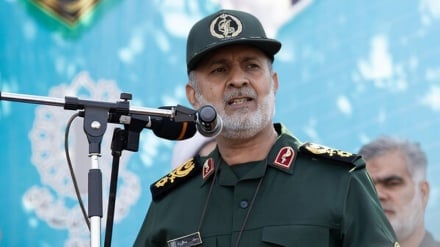Birthday of Hazrat Zainab (PBUH)
Greetings and congratulations on the blessed birthday of an Immaculate Lady whose virtuous personality transcends the barriers of time, space, geography, and even faiths, for the role she played in safeguarding humanitarian values.
Today, Wednesday the 1st of January happens to be the 5th of the Islamic month of Jamadi al-Awwal, the day on which in the year 6 AH, corresponding to 627 AD, a noble girl was born in a blessed household. She grew up into an Immaculate Lady of outstanding virtue, to the extent that when circumstances demanded she patiently endured terrible adversities for the sake of humanity and humanitarian values, which have earned her immortal fame.
She was none other than Hazrat Zainab (Peace be upon her), the grand-daughter of the Almighty’s Last and Greatest Messenger, Prophet Mohammad (Blessings of God upon him and his progeny). She nursed Islam back to life after the calamitous tragedy of Karbala. No wonder, her auspicious birthday is celebrated in Islamic Iran as “Nurse Day” to honour the brave Iranian Muslim ladies, who treaded her path to provide valuable behind-the-frontlines-support for Iran's Muslim combatants during the 8-year war the US had imposed in the 1980s through Saddam or the repressive Ba’th minority regime of Baghdad.
Don't, however, get the wrong notion that the Prophet's granddaughter had anything to do with the profession of the paramedics. No, her personality was transcendental covering all virtuous human traits. True, her diligent care for her sick, bedridden 23-year old nephew, Imam Zain al-Abedin (AS), in the equally tragic aftermath of the heartrending tragedy of Karbala, restored him to health and she also provided solace to the orphans and widows of the epic of Ashura, but the real task of Hazrat Zainab (peace upon her) was to nurture Islamic teachings and demonstrate their practicability in society.
She did this in such a unique manner that till this day Islam and Muslims are indebted to her brilliant sermons which she delivered in the state of captivity that continue to inspire posterity to greater heights, as today the brave Muslim women of Bahrain, Yemen, Lebanon, Iraq, and other places reeling under brutal oppression, are doing.
“Dear Aunt! You are by the grace of God a scholar, unschooled by anyone, and a sage by connation.”
This phrase is indeed the fitting tribute to Lady Zainab (peace upon her) by Imam Zain al-Abedin (AS), the son and successor of her martyred brother, Imam Husain (AS). It is acknowledgement of her dynamic personality that continues to transcend history and historical developments – otherwise we would not have been celebrating her birthday today despite the passing of a millennium and four centuries.
She was hardly five years old when she suffered a double blow of tragedy when her dear mother, Hazrat Fatema Zahra (peace upon her) was martyred, within three months of the Prophet’s departure from the world. The loving father, Imam Ali (AS) instilled in her the finest qualities of virtue.
When Hazrat Zainab (peace upon her) came of age, she married her first cousin, Abdullah, the eldest son of her paternal uncle, Ja'far at-Tayyar – the first-ever Muslim to undertake migration for the sake of protecting and propagating Islam, to the court of King Negus (Najashi) of Abyssinia (or modern day Ethiopia). Abdullah was brought up by the Prophet, who had prayed to God to grant prosperity in the child’s affairs. As a result he never suffered loss in his trade activities and earned fame as Bahr al-Joud (or Sea of Bounty) and Manarat as-Sakhawa (or Minaret of Generosity). But the greatest honour for him, for which he was thankful to God all his life, was his marriage to Hazrat Zainab (peace upon her).
He greatly respected the Prophet's granddaughter as the Aqeelat al-Bani Hashem or the Wise Lady of the Hashemite Clan. When the fateful journey of Imam Husain (AS) commenced in 60 AH, Abdullah allowed her to accompany her brother along with two of his sons, Aoun and Mohammad, who were eventually martyred in Karbala in defence of humanitarian values, leaving their middle-aged mother the gargantuan task of nursing Islam back to life with her young nephew, standing steadfastly beside her in captivity.
As a matter of fact, Lady Zainab and Imam Zain al-Abedin (peace upon them), not only internationalized and universalized the tragedy of Karbala, but as was the goal of her martyred brother, they immortalized it for the salvation of humanity, so that mankind in every age, era or geographical place could sift truth from falsehood by contemplating on the uprising of Imam Husain (AS).
Thus, when any conscientious mind turns to the Epic of Ashura and the equally traumatic aftermath of history’s greatest-ever tragedy, it will acknowledge that Islam and all humanitarian values, without the least doubt, are also indebted forever to the lady whose indefatigable role earned her the title of “Sharikat al-Husain” or partner in the mission of Imam Husain (AS).
It is also not for no reason that the Heroine of Karbala, who salvaged Islam, is rightfully called “Sani-e Zahra” or second only to the noblest lady of all time, her mother, Hazrat Fatema Zahra (peace upon her).
Groomed by her father, the Gateway of the City of Knowledge, she bore a striking resemblance to her maternal grandmother, Omm al-Momineen or the Mother of all True Believers, Hazrat Khadijia (peace upon her), who spent all her proverbial wealth for the sake of Islam and the persecuted neo Muslim community, and for 25 long years, till her death, was the one and only wife of Prophet Mohammad (Blessings of God upon him and his progeny).
On her father’s side, Hazrat Zainab (peace upon her) was the granddaughter of the Impeccable Fatema bint Asad (peace upon her), the lady who along with her husband Abu Taleb, had brought up the orphaned Prophet as her own son.
With such a firm foundation of lineal descent, Hazrat Zainab (peace upon her), grew into an extremely knowledgeable and wise lady, since in Islam, the pursuit of knowledge is not confined to men, but women are also urged to acquire it. Unlike other creeds and cultures, Islam restored woman to her natural status in society with emphasis on learning so that literate and knowledgeable mothers could properly groom their children, the future hope of the society.
In view of these facts, Lady Zainab (peace upon her) was immune from any ignorance and possessed God-given knowledge with certitude.
In Kufa, during the caliphate of her father Imam Ali (AS), she assumed the role of educating ladies and was known for her excellent explanation of the holy Qur’an.
Twenty years later in 61 AH, when the caravan of the noble captives was taken through Kufa, the former capital of her illustrious father, Hazrat Zainab (peace upon her), the teacher of the Kufan women that she once was, brought tears to the eyes of every onlooker and made them repent of their cowardice in deserting Imam Husain (AS).
In Kufa, during her captivity following the heartrending tragedy of Karbala, when the tyrannical Omayyud governor, Obaidollah ibn Ziyad tried to mock at the heads of martyrs by saying that this was the Will of God for all those who rise against the rulers, the Prophet’s granddaughter retorted that the Almighty had bestowed her household with the glories of faith and martyrdom against infidelity. She was so content with Divine Will that she boldly said that whatever she had seen in Karbala was nothing but beautiful.
In the Omayyud capital, Damascus, as well, she gave a remarkable display of her faith, virtue and knowledge, as could be gleaned from her memorable sermons that finally forced Yazid to release the noble household and allow them to return to Medina. Upon release, the noble lady laid the foundations of the mourning ceremonies for the Martyrs of Karbala – ceremonies that continue to inspire the faithful in the months of Muharram and Safar.
It was thus the sister’s patience that made the message of the brother resound with glory in the courts of the perpetrators of history’s most heart-wrenching tragedy and ensured that as long as the martyrdom of Imam Husain (AS) will be commemorated, the name of Zainab (peace upon her) will also shine with radiance.
Now we understand why dedicated youths from around the world, including Iran, assembled in Damascus over the past few years at the risk to their life in order to defend the sanctity of the shrine of the Prophet’s granddaughter from the mischief of takfiri terrorists.
AS/ME


